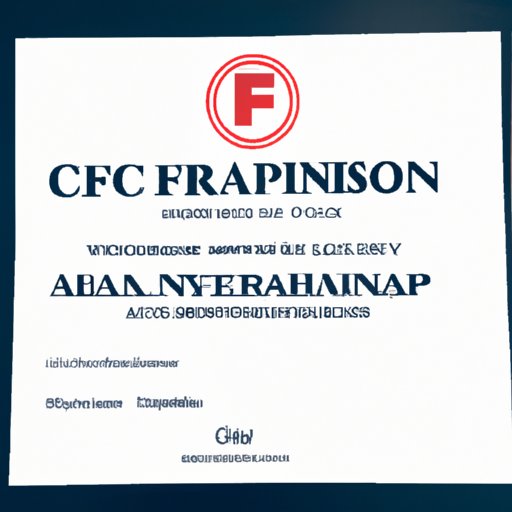Introduction: What is a Certified Financial Advisor?
A certified financial advisor (CFA) is a professional who provides advice and guidance on financial matters to individuals, families, businesses, and organizations. They are knowledgeable in areas such as investment planning, retirement planning, tax planning, estate planning, insurance, and more. A certified financial advisor can help you make informed decisions about your finances and provide personalized strategies to help you reach your goals.
Benefits of Working With a Certified Financial Advisor
Working with a certified financial advisor can bring many benefits. They can provide objective advice and unbiased information that can help you make informed decisions. They can also help you identify your financial goals and create a plan to reach them. Additionally, they can provide guidance on investments, taxes, retirement planning, and other financial matters. By working with a certified financial advisor, you can be sure that you are getting the most out of your money and making the best decisions for your financial future.

Types of Certifications a Financial Advisor Can Have
There are several different types of certifications that a financial advisor can have. The most common are the Certified Financial Planner (CFP), Chartered Financial Analyst (CFA), Chartered Investment Counselor (CIC), and Registered Investment Advisor (RIA). Each of these certifications require different levels of education, experience, and knowledge. It is important to understand the differences between the various certifications so you can find the best advisor for your needs.
Certified Financial Planner (CFP)
The CFP designation is the most widely recognized certification for financial advisors. To become a CFP, an individual must complete a comprehensive educational program and pass an exam. They must also demonstrate a minimum level of experience and adhere to a code of ethics. CFPs are qualified to provide advice on a wide range of financial topics including investments, taxes, retirement planning, estate planning, insurance, and more.
Chartered Financial Analyst (CFA)
The CFA designation is awarded by the CFA Institute and is designed for professionals who specialize in investment management. To become a CFA, an individual must complete a rigorous three-level exam, demonstrate a minimum level of experience, and adhere to a code of ethics. CFA holders are qualified to provide advice on a variety of investment topics including portfolio management, asset allocation, risk management, and more.
Chartered Investment Counselor (CIC)
The CIC designation is awarded by the Investment Counsel Association of America (ICA) and is designed for professionals who specialize in providing advice on complex investment strategies. To become a CIC, an individual must complete a comprehensive course of study, pass an exam, demonstrate a minimum level of experience, and adhere to a code of ethics. CIC holders are qualified to provide advice on a variety of investment topics including alternative investments, international investing, derivatives, and more.
Registered Investment Advisor (RIA)
The RIA designation is awarded by the Securities and Exchange Commission (SEC) and is designed for professionals who work in the financial services industry. To become an RIA, an individual must register with the SEC, demonstrate a minimum level of experience, and adhere to a code of ethics. RIAs are qualified to provide advice on a variety of financial topics including investments, taxes, retirement planning, estate planning, and more.

How to Find a Certified Financial Advisor in Your Area
Finding a certified financial advisor in your area doesn’t have to be difficult. There are several ways to search for a qualified advisor. You can start your search online, look for advisors in professional organizations, or ask friends and family for referrals. Here are some tips for finding the right advisor for you:
Online Search
The internet is a great resource for finding certified financial advisors. Most advisors have their own website where you can learn more about their qualifications, services offered, and fees. You can also check out online reviews from past and current clients. This can give you a better idea of what to expect when working with a particular advisor.
Professional Organizations
Many professional organizations offer resources for finding certified financial advisors. These organizations often have directories of certified advisors that you can access. You can also attend events hosted by the organization to meet and network with potential advisors.

Referrals from Friends and Family
One of the best ways to find a qualified financial advisor is to ask around. Talk to friends and family members who have worked with a certified financial advisor in the past. They can provide firsthand accounts of their experience and recommend an advisor they trust.
Common Questions to Ask When Interviewing a Certified Financial Advisor
Once you’ve found a few potential advisors, it’s important to interview them to make sure they are the right fit for you. Here are some questions to ask during the interview process:
- What is your experience and background?
- Do you have any specialties or areas of expertise?
- What services do you offer?
- What fees do you charge?
Understanding the Difference Between a Certified Financial Planner and a Certified Financial Advisor
It’s important to understand the difference between a certified financial planner (CFP) and a certified financial advisor (CFA). Both designations require a certain level of education, experience, and knowledge. However, there are some key differences between the two.
Overview of CFP vs CFA
Both CFPs and CFAs are qualified to provide advice on a variety of financial topics. However, CFPs are generally focused more on long-term financial planning while CFAs are focused more on investments. CFPs are also required to adhere to a code of ethics and have a fiduciary responsibility to their clients. CFAs are not required to adhere to a code of ethics and do not have a fiduciary responsibility to their clients.
Differences in Education Requirements
In order to become a CFP, an individual must complete a comprehensive educational program and pass an exam. To become a CFA, an individual must complete a rigorous three-level exam. Both designations require a minimum level of experience.

Differences in Scope of Services Offered
CFPs are qualified to provide advice on a wide range of financial topics including investments, taxes, retirement planning, estate planning, insurance, and more. CFAs are qualified to provide advice on a variety of investment topics including portfolio management, asset allocation, risk management, and more.
Conclusion
A certified financial advisor is a professional who can help you plan and manage your finances. They can provide objective advice and unbiased information to help you make informed decisions. There are several different types of certifications a financial advisor can have including CFP, CFA, CIC, and RIA. When searching for a certified financial advisor, you can use online resources, professional organizations, and referrals from friends and family. Be sure to ask questions during the interview process to ensure you find the right advisor for you.
(Note: Is this article not meeting your expectations? Do you have knowledge or insights to share? Unlock new opportunities and expand your reach by joining our authors team. Click Registration to join us and share your expertise with our readers.)
